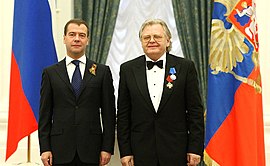Yuri Antonov
Yuri Mikhailovich Antonov (Russian: Юрий Михайлович Антонов; born 19 February 1945 in Tashkent, Uzbek SSR, Soviet Union) is a Soviet and Russian composer, singer and musician, People's Artist of Russia (1997).[1] He is also the Distinguished performer of arts of the Russian Federation (Russia) and the Distinguished artist of the Chechnya-Ingushetia ASSR (1983).
Yuri Antonov Юрий Антонов | |
|---|---|
_(2015-12-10)_04.jpg) Yuri Antonov in 2015 | |
| Born | Yuri Mikhailovich Antonov 19 February 1945 |
| Occupation | Singer, composer |
| Years active | 1969-present |
| Title | People's Artist of Russia (1997) |
| Awards |
|
Biography
Yuri Mikhailovich Antonov was born into the family of an officer of the Soviet Army, Mikhail Vasilievich Antonov, who after World War II stayed to serve in the military administration of Berlin.[2] Yuri's sister, Zhanna (Jane) was born there. His mother, Natalya Mikhailovna (Litovchenko), who was from Kremenchuk (Poltava Region), died in 2008 at age 85.
Antonov is one of the most popular and successful artists on Soviet 70's-80's pop scene[2] despite the fact that many of his songs (especially in early period) were banned by Soviet censorship. He appeared to an international television audience as a performer in the opening ceremony of the Moscow 1986 Goodwill Games. In 1997 Yuri Antonov received a star on the Star Square in Moscow.
Cinematography
He has composed music for the films Take Care of the Women! (1981), Before We Part (1984), Beauty Salon (1985) and Fools Die on Friday (1990).
Popular songs

_04_(cropped).jpg)
- Net tebya prekrasnei on YouTube
- Kryusha doma tvoego on YouTube
- Ne zabyvai (Mechta sbyvaetsya) on YouTube
- Ot pechali do radosti on YouTube
- U berez i sosen on YouTube
- More on YouTube
- Beliy teplohod on YouTube
- Ya vspominaiu on YouTube
- Zerkalo on YouTube
- Na vysokom beregu on YouTube
- Ne govorite mne proschai on YouTube
- Neset Menya Techenie on YouTube
- 20 let spustya on YouTube
Album collection
He has released 30 albums, including a 19-track CD in 1992 on Mezhdunarodnaya Kniga, entitled Mirror.
Awards
| Awards | ||
|---|---|---|
| Ovation | ||
| Preceded by 1999 Valery Leontiev |
Living Legend Award 2000 Yuri Antonov |
Succeeded by 2001 Igor Moiseyev |
References
- Biography (in Russian)
- Звёздный журнал: биография Юрия Антонова
External links
| Wikimedia Commons has media related to Yuri Antonov (musician). |
- Yuri Antonov on IMDb
- Official site (in Russian)
- Official page on Youtube
- Yuri Antonov at the Forbes
- Yuri Antonov discography at Discogs